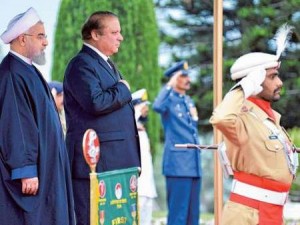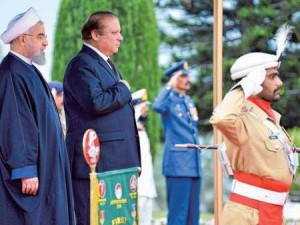- Islamabad will maintain its strategic relationship with Saudi Arabia and the other GCC countries and that is why it has joined the Saudi led anti-terror coalition
Gulf News
Tariq Osman Hyder
 Iranian President Hassan Rouhani’s visit to Pakistan last week was the first Iranian bilateral summit visit since 2002.The bilateral relationship has never reached its full potential despite the recognition by Pakistan that, in a difficult neighbourhood, a close relationship with neighbouring Iran is an economic, political and strategic necessity. Bounded only to ensure that it does not adversely affect the long-standing strategic partnership with Saudi Arabia and its GCC partners.
Iranian President Hassan Rouhani’s visit to Pakistan last week was the first Iranian bilateral summit visit since 2002.The bilateral relationship has never reached its full potential despite the recognition by Pakistan that, in a difficult neighbourhood, a close relationship with neighbouring Iran is an economic, political and strategic necessity. Bounded only to ensure that it does not adversely affect the long-standing strategic partnership with Saudi Arabia and its GCC partners.
There have been high points, such as Iran’s support during Pakistan’s 1965 and 1971 conflicts with its Eastern neighbour. During the Iran-Iraq Gulf War, Pakistan remained scrupulously neutral, but being next door to Iran served as a rear base for essential civilian supplies.
During the crisis over its nuclear programme, Iran was almost completely surrounded, both geographically and politically, by Western countries. Only Pakistan in the region stood apart and, unlike India, refused to support the resolution in the IAEA referring Iran to the Security Council and the resulting sanctions. Pakistan consistently insisted that there should be no coercion or use of force; while Iran should fulfil its international obligations, its rights under the NPT to peaceful nuclear energy must reciprocally also be respected; and that Pakistan not being a party to the negotiations took no position on what the outcome should be beyond urging both sides to work for a peaceful negotiated solution. Having helped draft these policy principles, I am aware of the pressures Pakistan was subjected to and resisted.
The reverse side of the coin has been the Iranian attitude. Pride in its ancient civilisation led to occasional arrogance. A hawkish or hard-line approach towards Pakistan has often been felt. Pakistan became a battleground for sectarian ideologies and violence fuelled by external support from otherwise friendly regional countries.
Iran has been concerned over the security of the 909km border and the flow of smuggled goods, narcotics and human smuggling in both directions. Its border provinces have restive religious minorities whose insurgent leaders sometimes flee across to Afghanistan and Pakistan where they are caught and handed back.
The need for change was felt by both sides. Rouhani set the tone right from his reception at the airport by the Pakistani Prime Minister Nawaz Sharif. It was clear that a rapport had immediately been established. Throughout the visit, in the exchange of views between the leaders, the Business Forum they both chaired, the official talks and in the concluding press conference, Rouhani was forthcoming on all major issues, without any caveats or complaints.
Rouhani assured that Iran would provide for Pakistan’s energy shortfall needs by completing the remaining part of the Iran-Pakistan gas pipeline and ramping up the existing supply of 75MW of electricity to 3,000MW. He also declared that the security of each country was vital to the security of the other.
While the gas pipeline from Turkmenistan is also necessary, the Iranian pipeline is the most feasible to immediately contribute to Pakistan’s energy security. The Ministry of Petroleum is naturally cautious, as past assurance by Iran has been difficult to materialise and because the deal with Qatar for LNG (a natural gas) is very favourable indeed. However, strategically, an overland pipeline is more secure than shipments whose interdiction are an objective of a potential adversary’s contingency naval strategy. Energy is the engine of economic growth and once a supply is established demand doubles in no time.
Pakistan should focus on the pipeline and if required renegotiate the contract given energy prices in free fall. As the pipeline will use the gas from the South Pars field shared with Qatar, which is wasting no time in turning it into LNG, Iran needs to, “use it or lose it,” which should incline it towards a reasonable pricing solution.
Given the improved relations, are there any communalities of approach within a region beset by polarisation and conflict? There are way in which both sides can work together: Mutual border security can be improved; both countries can work more closely together in their trilateral cooperation with Afghanistan encouraging political resolution and development; both share the objective of all the Muslim countries in the region that they should be united to face common threats rather that remain divided.
The difference of approach and apprehensions of the GCC countries on one side and Iran on the other are wide-ranging, and reaching an understanding will depend on both sides setting and abiding by certain limits of non-interference. Once the pipeline becomes a reality, India might well rejoin as it has done with the Turkmen pipeline. The resulting regional energy connectivity and mutual dependency would constitute an important CBM and move the Pakistan-India relationship beyond India’s counterterrorism single plank.
An improved relationship should also remove misunderstandings and hopefully their causes, be it border security, sectarian funding or apprehensions that Iran is one of the many regional and extra-regional countries who do not find the China-Pakistan Economic Corridor multi-dimensional project to be in accordance with their own interests.
Iran will further understand that Pakistan, while it has not joined the GCC forces in Yemen, will maintain its strategic relationship with Saudi Arabia and the other GCC countries and that is why it has joined the Saudi led anti-terror coalition and participated in their recent military exercise. The GCC should also understand that the pipeline from Iran will contribute to Pakistan’s economic take-off and a stronger Pakistan is very much in their interests as well.



